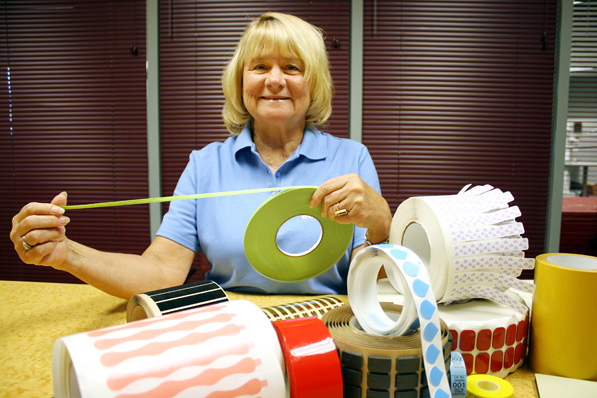“My dad always told me I couldn’t work in the family business because I was a girl, but in 1975, his secretary quit, and he called me in a panic asking me to take her place,” says Ann Wegmann, now president of Budnick Converting, Inc.
Founded by Edward “Bud” Schwartz and Nick Cutlich, Budnick was initially a reseller of tool supplies, from drill bits to files. Gradually, it expanded into packaging and janitorial supplies, and at some point, due to a customer’s request, Schwartz threw some electrical tape into an order. By the time Wegmann joined, tape had become a significant part of the business.
“That was always more exciting to me,” says Wegmann, who was educated to be a high school teacher, but worked in retail when she couldn’t find a job after graduating from college. “It’s not exciting to buy a drill bit for a nickel and sell it for a dime. In fact, drill bits aren’t exciting at all. But tape has color and texture, and you can do all sorts of things with it. And you can sell it in so many different industries for different applications.”

In 1975, Wegmann was one of four employees at Budnick, which was doing roughly $500,000 a year in business. Its expansion came with the purchase of a tape-slitting machine, which allowed the company to customize tape sizes to meet client needs. “Back in the 1970s, a lot of traditional customers were going out of business, part of an industry-wide trend, and we were selling more and more to people buying tape, like the automobile and appliance industries, both of which use a tremendous amount of tape,” Wegmann says. “But a lot of the time, we couldn’t meet customer demand, because no matter what size tape we had in stock, a customer would want a different size. So I told my dad, we need to buy tape in long rolls, called log rolls, and cut them to size.”
It was 1986 when Schwartz agreed and purchased a lathe slitter, and in keeping with the new business model—converting log rolls into tape—renamed the company Budnick Converting. Today, it has ninety-five employees and an annual revenue of $31 million, an achievement Wegmann says is a result of hiring good people for sales and operations. “My strategy for hiring has always been to find smart people with good attitudes, then teach them what they need to know,” says Wegmann, who took over as president of the company in 2004.
The road wasn’t always smooth. When the economy went downhill in 2008 and 2009, for example, many of Budnick’s customers, facing their own challenges, placed fewer orders. At the same time, one customer that had ordered $1.8 million of tape refused to pay. “It was a terrible, terrible time,” Wegmann says. “It was the only point in the company’s life when we had to let people go.”
Budnick persevered, however, and in 2008, was able to expand by forming a joint venture with a Mexican company. “I wanted to open a business in Mexico, because one of our best customers had opened a plant in Monterrey, but I didn’t know how do to so, because operating a business in another country is always a challenge,” Wegmann says. When she met Jose Luis Cantu of Monterrey-based PAE through a vendor, however, it was a perfect match. “I wanted to store tape in his warehouse, and he wanted to start a converting business,” Wegmann says. After a few meetings, a joint venture called Excelcuts was born.
Today, Budnick stays on the cutting edge of the tape-converting business by ensuring it has the most innovative equipment available. “We do so many things—die cutting, spooling, rewind slitting, and water jet cutting—and want to remain the most versatile converter of tape in the United States,” Wegmann says.
That level of innovation necessitates that the company constantly scour the market for new and different equipment. In addition, over the past four years, the company has begun exhibiting at trade shows. “We still sell our products through conventional sales calling, but now we also set up a booth and show people the kinds of machines we have and the things we can do with them,” Wegmann says. “I don’t ever want to find myself in a situation where I’m being told another company can do something better than we do.”

